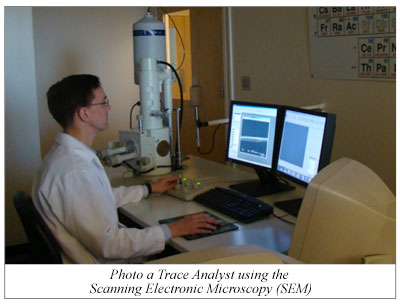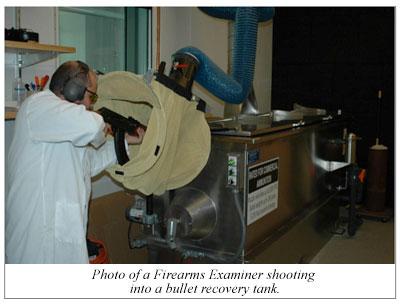Forensic Scientist Overview
The job duties and responsibilities of a Forensic Scientist are the following:
- Conduct analysis on evidence (various depending on discipline):
- Crime Scene Investigations
- Serological tests to identify and analyze body fluids, tissues and various types of related matter
- DNA analysis
- Digital Forensic Examinations
- Drug identification
- Hand writing comparisons and questioned document examinations
- Examination of firearms and firearms related evidence
- Latent fingerprint development and comparisons
- Polygraph Examinations
- Examination and determination of physical, microscopic, and compositional characteristics of physical evidence such as fibers, paint, glass, and ignitable liquids.
- Communicate analytical procedures, methodology, and conclusions to various representatives of the criminal justice system including court testimony as an expert witness.
- Participate in a proficiency testing program.
- Assist in calibration and maintenance of laboratory instruments.
- Participate in training and continuing education programs.
- Prepare laboratory case notes and written reports.
- Baccalaureate degree or higher with natural science, forensic science, and/or criminal justice courses.
- Baccalaureate degree or higher in digital/cyber forensics or computer science.
- A Baccalaureate degree in biology, chemistry, or forensic science.
- Must have successfully completed the following college courses: Genetics, Biochemistry, Molecular Biology and Statistics.
- A Baccalaureate degree in a natural science or forensic science that includes a minimum of one semester of physics and one year or equivalent in each of general chemistry, organic chemistry, and analytical chemistry/instrumental methods including lecture and associated laboratory classes.
- A Baccalaureate degree with science courses.
- Baccalaureate degree or five years’ experience as a polygraph examiner having graduated from a polygraph school accredited by the American Polygraph Association.
- Basic knowledge of the theory and practical operation of a variety of scientific instrumentation and analytical techniques.
- Ability to communicate clearly in English both orally and in writing with scientific and non-scientific personnel.
- Must have the ability to differentiate colors as evidenced by medical certification.
- Must possess a valid Indiana State Driver’s License.
- Ability to travel by aircraft.
- Ability to attend training at alternate locations for extended periods of time.


The educational requirements for a Forensic Scientist are as follows:
Crime Scene Investigation
Digital Forensic Examination
DNA Analysis
Drug Analysis and Microanalysis
Firearms Examination, Latent Prints Comparisons and Questioned Documents Analysis
Polygraph Examination
The general job requirements and essential functions for a Forensic Scientists are as follows:
